Genesis 25:19-34
Posted in Worship
Whose Freedom?
Romans 7:15, 20-25a; Matthew 11:25-30

Growing up, the 4th of July was my favorite holiday. I can’t claim that it had much to do with enthusiasm about our country. I liked dressing up, riding in a bike parade, and eating bratwurst. Plus, because my birthday is on the 3rd, the 4th seemed like an extended celebration of ME, complete with fireworks.
But this holiday is not about my birthday, or bratwurst, or bikes. It commemorates the signing of the Declaration of Independence in 1776, the Continental Congress’s announcement that it would no longer be subject to British Rule. Independence Day has become a day to celebrate our nation more generally, whether that means remembering our highest ideals and most dedicated servants — or eating red, white, and blue cakes at family barbecues — or both.
Perhaps I am not alone in coming to this year’s celebration with more trepidation than usual. While there is a great deal about our country to celebrate, there is also much to repent of. This has always been true, and it is a mark of both my privilege and my ignorance that it has rarely weighed on me as much as it does this weekend.
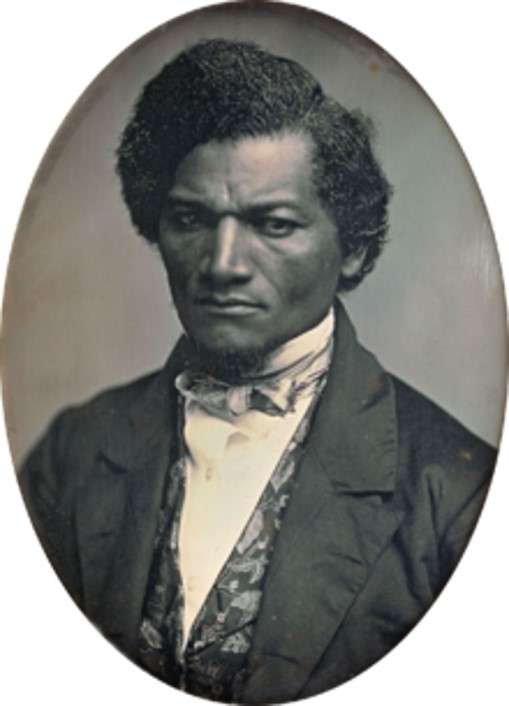
One of the most famous Independence Day speeches was given by Fredrick Douglass, who spoke in 1852 by the invitation of the Rochester NY Ladies’ Anti-Slavery Society. If you’ve never heard or read this speech, I commend it to you. If you know it already, I think it bears another hearing. I’ll quote just a tiny portion of it here.
Douglass praises the founders of our nation for their bravery. Then he reminds his audience:
“I am not included within the pale of this glorious anniversary! Your high independence only reveals the immeasurable distance between us. The blessings in which you, this day, rejoice, are not enjoyed in common. — The rich inheritance of justice, liberty, prosperity and independence, bequeathed by your [ancestors], is shared by you, not by me. The sunlight that brought life and healing to you, has brought stripes and death to me. This Fourth [of] July is yours, not mine. You may rejoice, I must mourn. To drag a man in fetters into the grand illuminated temple of liberty, and call upon him to join you in joyous anthems, were inhuman mockery and sacrilegious irony. Do you mean, citizens, to mock me, by asking me to speak to-day? …Fellow-citizens; above your national, tumultuous joy, I hear the mournful wail of millions! whose chains, heavy and grievous yesterday, are, to-day, rendered more intolerable by the jubilee shouts that reach them…
“What, to the American slave, is your 4th of July? I answer: a day that reveals … more than all other days in the year, the gross injustice and cruelty to which [they are] the constant victim. To [them], your celebration is a sham; your boasted liberty, an unholy license; your national greatness, swelling vanity; your sounds of rejoicing are empty and heartless; your denunciations of tyrants, brass fronted impudence; your shouts of liberty and equality, hollow mockery; your prayers and hymns, your sermons and thanksgivings, with all your religious parade, and solemnity, are, to [them], mere bombast, fraud, deception, impiety, and hypocrisy — a thin veil to cover up crimes … There is not a nation on the earth guilty of practices, more shocking and bloody, than are the people of these United States, at this very hour…”
Let’s not miss, either, what Douglass has to say about the church on that day:
“The American church is guilty, when viewed in connection with what it is doing to uphold slavery; but it is superlatively guilty when viewed in connection with its ability to abolish slavery. The sin of which it is guilty is one of omission as well as of commission…Let the religious press, the pulpit, the Sunday school, the conference meeting, the great ecclesiastical, missionary, Bible and tract associations of the land array their immense powers against slavery and slave-holding; and the whole system of crime and blood would be scattered to the winds; and that they do not do this involves them in the most awful responsibility of which the mind can conceive…”
The United States does not now have the kind of enslavement that was carried out in 1852, when this speech was given. But Douglass’ words ring true today nevertheless. Whose freedom do we celebrate on our Independence Day? What stories do we tell about who we are as a nation? If we fail to tell stories of stealing land from native peoples, of stealing lives from enslaved Africans, how can we claim any honesty in our accounts? And if we have not yet fully acknowledged these, our original sins — and all of our crimes against human freedom in more recent years– how can we build a future in which every person within our national boundaries may truly enjoy life, liberty, and the pursuit of happiness?
As Christians, the weight of our moral failure to use our power to abolish slavery and other forms of oppression is heavy. If churches had together upheld the preciousness of all human life at any point in our national history, how might that history have been different?
At the same time, I feel the great gifts that our faith has to offer, in confronting the past and present of our country.
In our scriptures today, Jesus describes God’s wisdom as best understood by those who are like children. The apostle Paul confesses the power of evil that threatens to overcome him from within, even when he desires to do good. Both speak to the importance of immense humility in our ability to grow: humility, and a reliance on a power greater than ourselves.
Jesus says, “Come to me, all you that are weary and are carrying heavy burdens, and I will give you rest. Take my yoke upon you, and learn from me; for I am gentle and humble in heart, and you will find rest for your souls. For my yoke is easy, and my burden is light.”
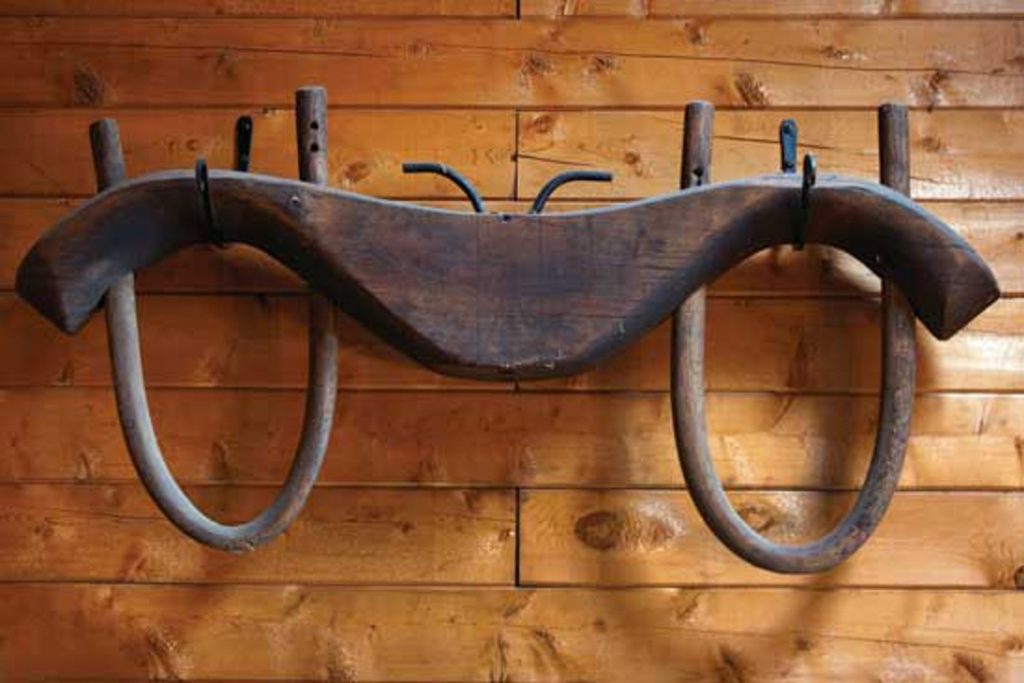
We, the people of this country, have a choice. We could continue to carry the weight of our ignorance and sin around, refusing to admit it even exists, while it continues to cause destruction. Or, we could acknowledge it, and seek the help of a power greater than ourselves, in getting ourselves free. We could accept the shared work of discovering how to escape the roles of oppressor and oppressed, for the common cause of mutual liberation.
Please pray with me.Holy God, with great aspirations, willful ignorance, stunning greed, and terrible suffering, we have strayed so far from your dream for us. Thank you for meeting our guilt and our grief with compassion. Help us to bring humility, curiosity, and determination to the work of freedom in this land: a freedom we must achieve together. Amen.
Welcoming Prophets
Romans 6:12-13 and Matthew 10:40-42

In the Gospel of Matthew, Jesus gathers his disciples, and then he sends them out. Jesus sends the disciples out to share the good news that “The kingdom of heaven has come near.” He sends the disciples out to heal many forms of illness. Jesus sends the disciples out with no supplies whatsoever, and he forbids them from accepting any form of payment. Instead, they must simply offer themselves to whoever will accept them in each place that they go.
This kind of traveling and teaching and healing will not be easy, Jesus warns. In fact, the disciples will be as sheep in the midst of wolves. They will experience hatred and betrayal, family strife and persecution. They will need to be as wise as serpents to survive it, shaking the dust off their feet as they leave any unwelcoming place.
Still, Jesus tells them, “whoever welcomes you welcomes me, and whoever welcomes me welcomes the one who sent me. Whoever welcomes a prophet in the name of a prophet will receive a prophet’s reward; and whoever welcomes a righteous person in the name of a righteous person will receive the reward of the righteous.”
Hearing what Jesus asks his first disciples to do, I find myself feeling oddly grateful that I am not one of them. But the selection of text that we hear today invites us to consider not what it would be like to be one of those disciples, but instead to wonder about those who encounter them in their tavels.

Would we have welcomed one of these folks, if they arrived in our town, or at our door? Would the risk of inviting in a poor stranger be worth the great rewards of which Jesus speaks? I’m not sure how I would feel about welcoming someone who arrived with no introduction, no social standing, no luggage — nothing. I’m even less sure that I would be ready to welcome that person if they were a prophet.
In biblical tradition, prophets are trouble! They don’t so much predict the future as tell us deep truths about the present: truths that we have tried very hard not to acknowledge. Prophets speak with passion; they don’t hold back. Prophets cause conflict, within our hearts and within our societies. And just like the disciples, they generally arrive without warning, without introduction, without power, without privilege — and they are audacious enough to share their truths anyway.
Last week, after listening to The Rev. Dr. Otis Moss, III preach about the tragedies of racialized oppression and white supremacy in our country, a group of us talked about what we about what we have been taught, and what we have not been taught. There was general agreement that our education is not what it should have been – though many of us received what is generally considered to be excellent schooling. When it comes to American history and politics and economics, we have been lied to. We have been audaciously and systematically lied to. Maybe you have been lied to, as well.
But as I listened to our conversation it kept coming forcefully to my heart that we can yet be saved from this terrible conspiracy of miseducation. Here is the good news: we have never wanted for good teachers. Our school systems, our curriculums, and the powers that controlled them, may have failed us in many regards. But teachers of truth have always shown up anyway. Without invitation, without permission, teachers have shown up with Holy Spirit fire and truth for us, if we will only receive their teachings.

Who are these teachers? Today, perhaps we can remember those truth tellers who showed up at the Stonewall Inn, starting early in the morning on this day, June 28th, in 1969. At that time, LGBTQ folks in America were being openly and systemically persecuted: tracked by the FBI, criminalized by local governments, and labelled as having mental disorders. To be honest about who you were at any time, in any place, was to risk your employment, your freedom, and even your life. Tragically, this is all still true to some extent today.
In the early morning hours of that June 28th, there were a lot of folks at the Stonewall Inn, a gathering space for those whose gender identities and expressions, as well as their sexual orientations, race, and class, made them particularly vulnerable in our society. These folks had come to the only gay bar in NYC that allowed dancing. And then the raid started. Police raids on gay bars were common, but this raid was particularly violent. In addition to the regular practices of demanding ID, verifying biological sex, and placing people under arrest, this raid included sexual assault and beatings. It was, witnesses and participants said, the last straw. A riot began.
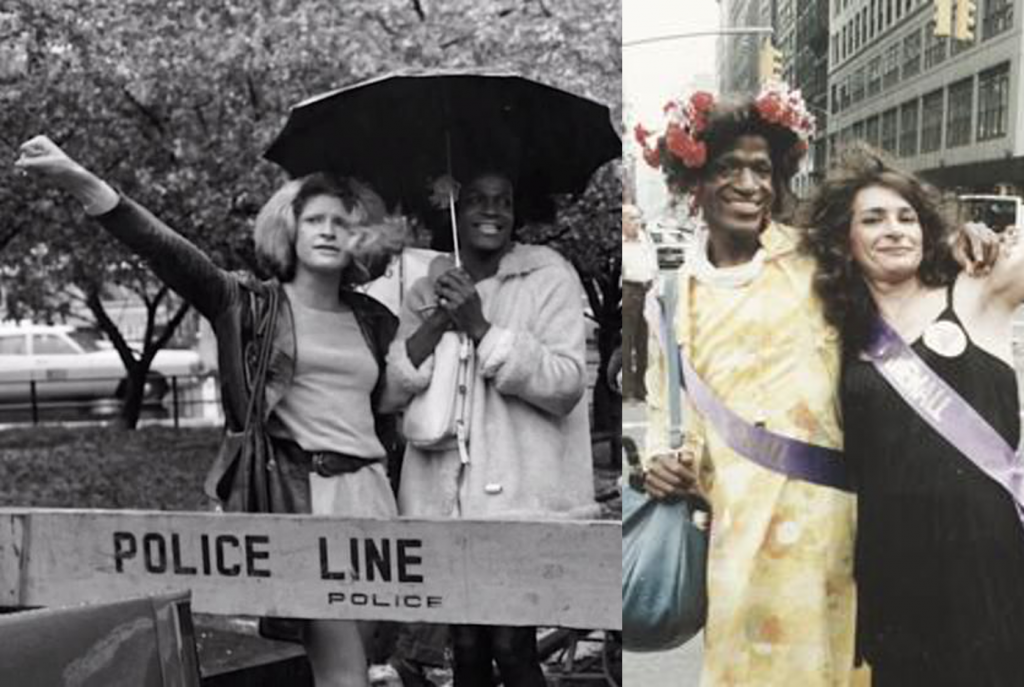
Who led the way in the days that followed, a critical turning point in the emergence of a Gay rights movement? It was people like Marsha P. Johnson, a Black self-identified Drag Queen. And Stonewall was only the beginning of their activism. Johnson became a founding member of the Gay Liberation Front. A leader in Greenwich village, Johnson was known as the “Mayor of Christopher Street.” Along with friend Sylvia Rivera, Johnson founded an organization called Street Transvestite Action Revolutionaries, providing shelter and food to homeless queer youth and fighting for transgender rights. Later, Johnson became an AIDS activist with ACT UP. Not always accepted even within gay rights efforts, Marsha P. Johnson’s presence and work taught the world a truth that was radical then and continues to be all too radical now. I have value, they insisted, people like me have value, and are entitled to the same rights as anyone else.
Those of us who read the book White Fragility last year received this teaching through author Robin DiAngelo. She shared the response of a man of color when asked what it would be like for white people to be open to feedback, to be willing to learn. He replied, “It would be revolutionary.”
Beloved, most of us, white or not, have been badly taught: in school, and in society. But what we were never told, we can still learn, as long as we are willing to welcome those teachers, those prophets, who have always been trying to teach us. Not all prophets have fancy degrees, or work in fancy schools. Not all prophets look like someone you’d expect to show up in your town, or at your door. But countless prophets have offered the world the gift of their truth with astounding bravery; have insisted on the preciousness and dignity of human and natural life.
We have been badly taught. But we can learn, even those of us who are white. And we can use whatever power and privilege we have – many of us have a lot of it – to amplify and to fund the work of prophets and activists and change-makers of all kinds today. God, in her wisdom, invites us not into shame for what we have thought, and who we have been, but into the freedom of a greater love. God invites us into a new life, in which, as the Apostle Paul writes, we can offer every part of ourselves to God as an instrument of righteousness. May it be so.

The Cross and the Lynching Tree
We were privileged on Sunday to receive the gift of the Rev. Dr. Otis Moss III’s gift, The Cross and the Lynching Tree: A Requiem for Ahmaud Arbery. Watch it here!
Confirmation Values & Questions
This past year, seven young people gathered monthly with Joyce and Hannah to explore Christian beliefs and practices. These students have put in time and effort, and like many of us, they have not yet come up with many definitive answers about their own beliefs. So on Confirmation Sunday they shared some of their values and questions with us today. We’ve taken statements from all of the students and mixed them up together, and I’m grateful that many of the students got together virtually to record it. I invite you to listen to them and to consider what you value, and what you wonder about God, Jesus, Spirit, and Church.
Following God Through the Wilderness
by Jessica Torgerson
I met with Hannah earlier this spring to talk about Children’s Sunday and to plan out how, exactly, we were going to do this. To be honest, March and April were a blur of anxiety and stress and uncertainty for me and it was hard to wrap my head around planning a brand new medium for Children’s Sunday. I felt pretty lost at times, without a map, but doing my best to navigate this new normal. So this is my headspace when Hannah suggests adapting pretty much the entire book of Exodus into a drama for Children’s Sunday, but focusing mainly on the Israelites in the wilderness – wandering in the wilderness for 40 years. Can you imagine the fear, the uncertainty, the frustration the Israelites must have felt? Well, yeah. Yeah I kind of can, and our children can, and I bet you can too. This pandemic uprooted our lives just about as fast as the Israelites were uprooted when they fled Egypt. In the span of four days in March we went from pretty much business as usual to shut down, shuttered at home. No map. We were all wandering in fear, uncertainty and frustration.
Once freed from slavery, the Israelites were not too happy about their new nomad lifestyle. “When are we gonna be there? There’s nothing to eat! Do you even have a plan?” These were complaints that Moses and Aaron and Miriam had to address with God’s help. I’ve heard those same type of questions in my house recently. When are we going back to school? When can I see my friends? Do we have to wear these masks everywhere? When will this be over and we can go back to normal? Why is there no flour at the grocery store?! It is hard to wander without a map, without many answers. God heard the complaints of hunger from the Israelites and answered with a shower of sweet, flaky starch every morning. God heard the frustration and anger and confusion and gave the Israelites the Ten Commandments – a roadmap of how to live together as a community. And God heard the desperation and fear of the wandering mass and promised to lead them with a pillar of cloud by day and fire by night, never leaving them.
When we talked about this story in Sunday school, we noticed the similarities between the wandering Israelites and all the uncertainty in our own lives right now. But is God helping us and leading us right now, just as in the Exodus story? We compared God to a lighthouse, leading boats through a storm, providing comfort and safety, like a beacon home to those who may be lost. I asked the children, “What is your lighthouse right now? Who is helping you to find comfort and safety?”
My lighthouse is my teacher sending me school work to do every day because I really like school and I was really sad when I couldn’t go anymore
My lighthouse is doing a Zoom with my friends
I do crafts with my neighborhood and we share the crafts. We all do a different one and we share it on the computer.
I can FaceTime my friends and that makes me happy
We do more movie nights with my family and I like that. It’s fun.
And all the children mentioned some combination of hikes, walks, bike rides, and being out in the sun. Sunshine seems to help everything.
This is a scary and uncertain time for all of us, but particularly so for our children. Schools (and churches) are closed, routines have been upended, nothing fun is open, they are forbidden from being together with friends or even grandparents, and the grown-ups don’t have many answers. They are wandering – sometimes literally – in a very new wilderness. But children are resilient, and they are excellent at looking for that pillar of cloud or fire, for that lighthouse in the distance. I wonder, what is your lighthouse right now? Who or what helps you find comfort and safety and protection as you wander in this wilderness? Do you see God at work around you, leading us through the unknown? I see God through our leaders keeping us safe with new rules and guidelines, through our healthcare workers healing and protecting us, through neighbors who drop off a few cups of flour on our porch, through friends and family who strive to connect in new and creative ways. And through our children, who teach us every day that God’s lighthouse is burning bright, helping to guide us through this stormy wilderness.
Thanks be to God.
Pentecost Reflection
Acts 2:1-21
Today we celebrate the feast of Pentecost, remembering the story of the arrival of the Holy Spirit among the apostles, which also marks the birth of the church. I love this story. And as I searched for images for our service today, I noticed that many folks imagine the story of that first Pentecost a little differently than I do.
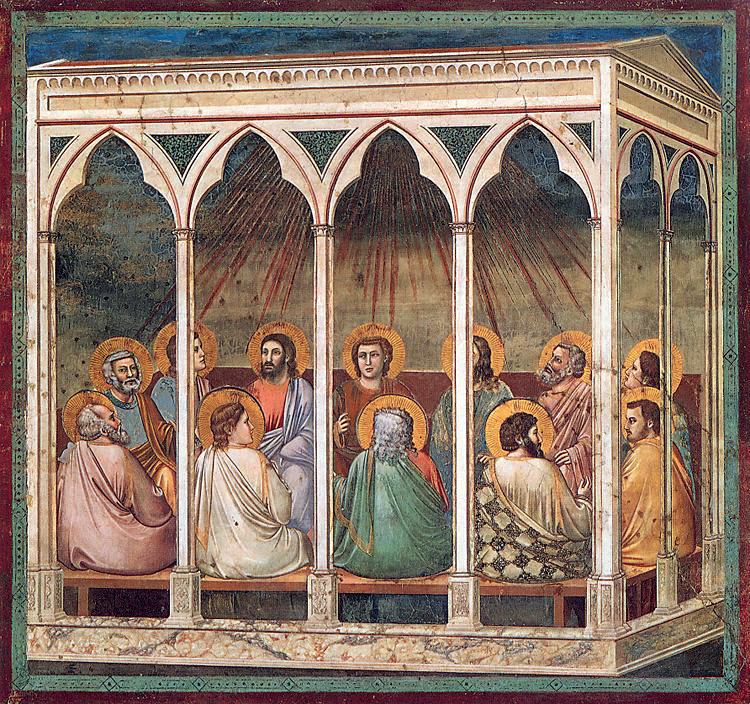
For instance, this image from Giotto di Bondone seems strangely… civilized. It’s as if a bunch of white guys got together for a board meeting in a beautiful pavilion. The Holy Spirit is descending among them, but she descends in an organized fashion, with one extremely straight line of flame reaching towards each head. No one seems alarmed by the fire. I’m not even sure they’ve noticed.
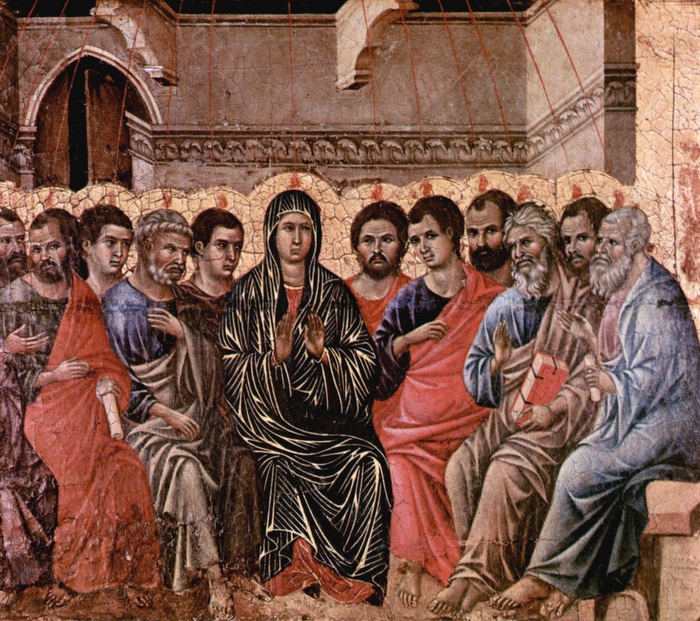
This lovely image is slightly less formal. The apostles are sitting closer together, and they’re not enclosed by pillars. Also, thankfully, this artist includes one woman in the events, Mary of Nazareth. However, the fire still descends in an extremely orderly way, and things feel restrained, even solemn.
In our scriptures we receive a very different story. There is the sound like the rush of a violent wind! There are divided tongues of fire resting on each of the apostles. Everyone is filled with the Holy Spirit and begins to speak in other languages! It is so loud that folks outside hear the commotion and come rushing up. It is so raucous, some folks in the crowd assume that the apostles must be drunk.
The Holy Spirit is the wild element in our Christian Trinity. She’s an advocate, a comforter, an agitator, an innovator. She is a complicated and sometimes contradictory force who brings power and change. It is the Holy Spirit who finally gets the apostles out the door, on the move, interacting with the people, spreading the good news.
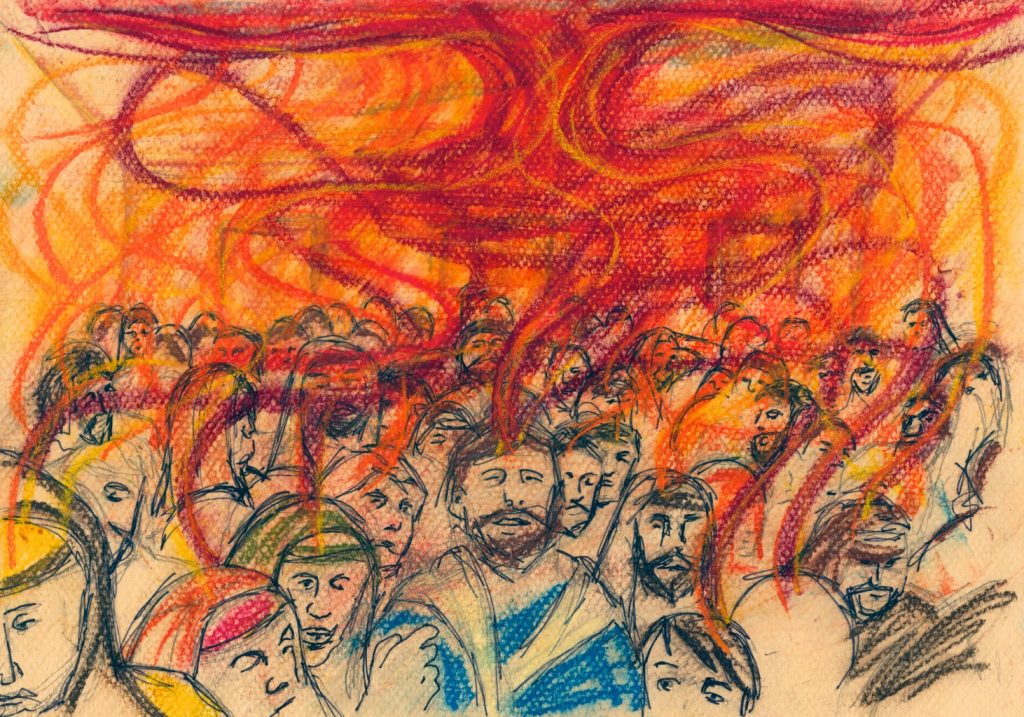
The Holy Spirit must really have been powerful in that little gathering of Jesus followers, because once the apostles get going, they don’t stop. They praise God, make disciples of Jesus, baptize, form radically generous communities, and travel off far and wide to keep the good news moving. They become the movement that is the church of Jesus.
I think we could benefit from some of that Holy Spirit power today.
We need Holy Spirit Wind. For those who cannot breathe, because of the pandemic sweeping our world. For those who cannot breathe, because of pollution. For those who cannot breathe, because of a knee on their neck, we need Holy Spirit Wind. Holy Spirit, come now.
We need Holy Spirit Fire. There have been fires this week in Minneapolis, one of my former homes, and elsewhere. And there are many decrying the destruction that riot and fire bring. It does seem that many actions may have been taken by white supremacists, and other agitators, and not those who protest racial injustice; a terrible betrayal. But when we witness the unleashing of the fire of anger and grief over loss of black life, we must remember that as the Rev. Dr. Martin Luther King Jr. said, “a riot is the language of the unheard.” Shame on us, if we cannot value life over property, if we ask for peace where there is no justice, if we ignore deadly police violence and focus only on protestor violence. We need Holy Spirit Fire. Holy Spirit, Come now.
We need God’s renewing, transforming force to enter into the buildings where we sit today. To enter into our hearts, and stir us to compassion and indignation and courage. To break into the institutions that enforce white supremacy. To break into the institutions that allow greed and violence when they are done by those who are white, or those who are in uniform. To break into a government and a society that too often condones hunger and want and oppression and death, that in these days regularly threatens free speech and a free press and human dignity.
We need Spirit boldness to give us hope that things can yet change for the good, and to empower us to be a part of that change. Holy Spirit, Come now.
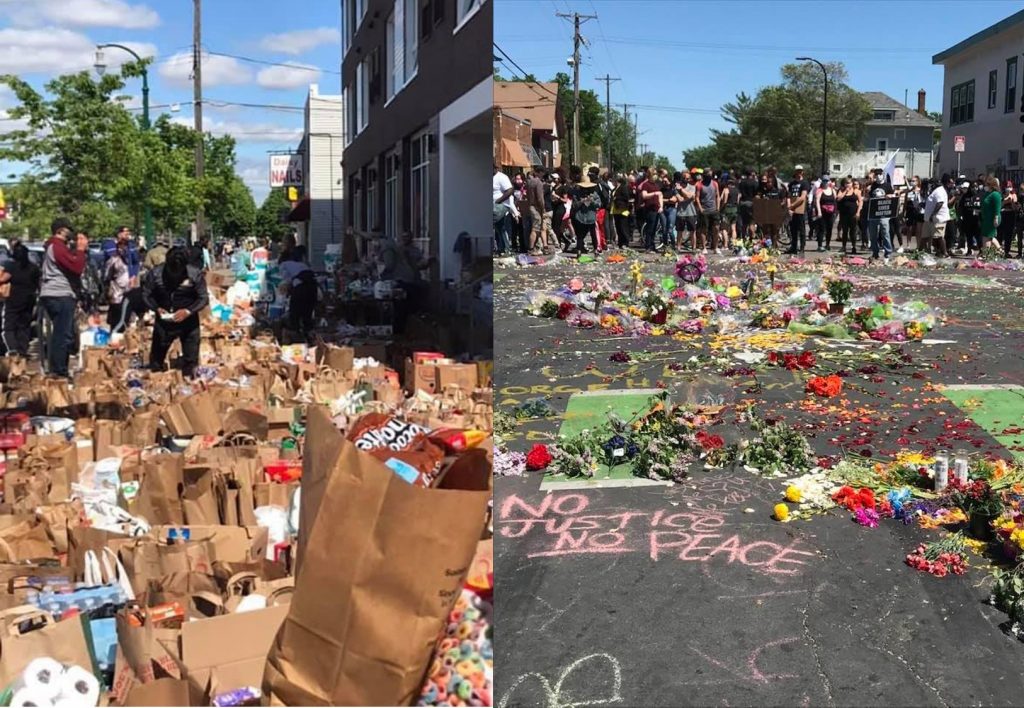
I want you to know what is happening alongside the nighttime fires in Minneapolis. People are showing up peacefully in great numbers during the day to protest, and to pray, and to mourn. People are showing up to clean the streets. People are showing up with bags of food, because transit and stores are closed, and they don’t want anyone to go hungry. Small businesses and churches that have never spoken publicly about police brutality or white supremacy before, and many others who have been in the work for decades, are organizing and testifying with boldness. And yesterday afternoon, following news concerning infiltration of the protests, Minneapolis organized block by block to keep one another safe, to protect minority businesses and churches and community organizations that were targeted for destruction. There is a massive movement gathering to face this crisis, and to imagine and demand what would truly keep the whole community safe. Holy Spirit, Come now.
No matter who you are, or what you need to be freed from, or what you need to be freed for: I hope you open your heart to the gifts of the Spirit today. May you feel the presence of the God who comes to us as breath, as wind, as fire. She will surprise us; perhaps even alarm us; all for the good. For a wild, rich, bold, radically just future awaits us, if only we allow her to move us into something new, as she did so long ago. May it be so.
Jesus Rises, Again
Luke 24:44-53
You may not be familiar with the story of the ascension. Like so many biblical stories, it’s a strange one.
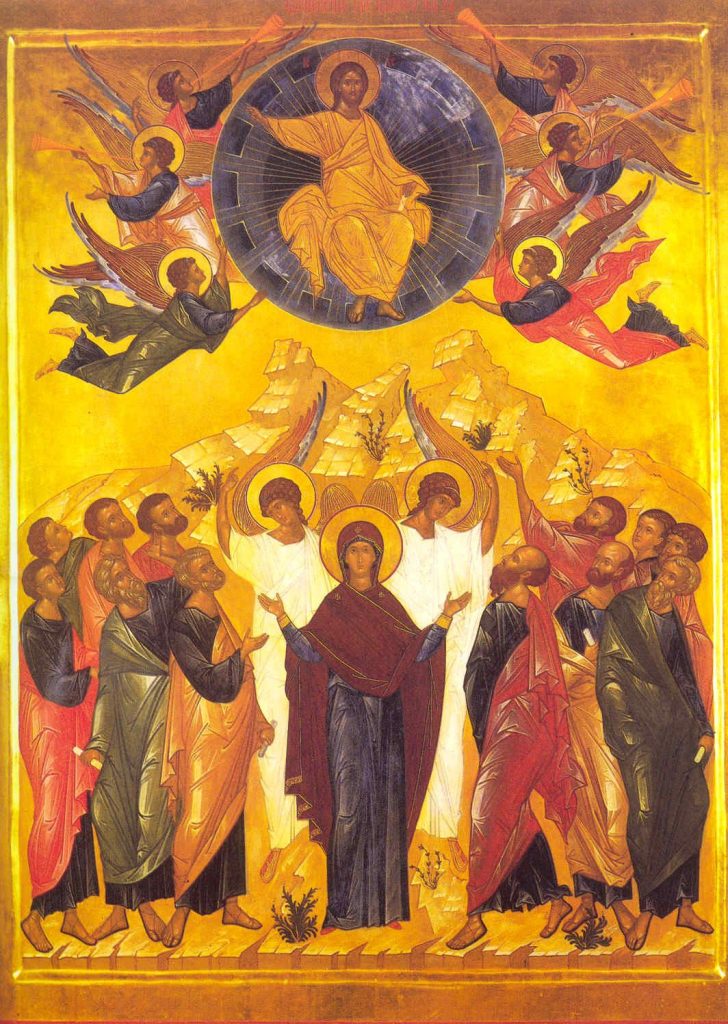
Let’s back up to where this story starts. Jesus, the child refugee who is also, somehow, God themself, grows up to be a rabbi: a teacher of faith, a teller of truth, a healer. He gathers people around him and proclaims the wonderful disruptive presence of God, here and now: as common and as transformative as yeast or seed or flame. Jesus’ teachings about pervasive and subversive divine love begin to challenge the powers that be: religious powers, social powers, political powers. So Jesus is killed. He goes down to break the gates of hell, and rises on the third day. Jesus spends 40 days after his resurrection on earth with his disciples, teaching them, eating with them, blessing them. And then, he is carried up into heaven.
The Ascension in art and music and liturgy is often a celebration of Jesus’ supremacy. In the letter to the Ephesians, the writer proclaims that God seated Jesus “at their right hand in the heavenly places, far above all rule and authority and power and dominion, and above every name that is named, not only in this age but also in the age to come. And God has put all things under Jesus’ feet and has made him the head over all things.”
Now it is wonderful to think of Jesus having so much power, Love having so much power in our world. Unfortunately, the way we imagine that power is often with language and imagery of European kingship: whiteness and maleness and hierarchical dominance. I don’t know about you, but images like this do not really evoke for me a radical and just reordering of the world.
What does it mean to say that Jesus ascends to heaven, anyway? Does his body literally rise? Do the disciples watch his feet hover above them, as some artists imagine? And whether or not Jesus’ body literally rises, what does this story teach us about the nature of God, and how God can influence our lives today?
The ascension reminds us that Jesus goes before us, blazing a trail towards God. Jesus shows us a way between earth and heaven, a way that we and our loved ones also travel when we die. Jesus’ ascension may be a kind of coronation, but it is also a coming home, a return to his source. We too, will find our final homes in the source and ground of our being, in the God who Jesus spoke about.
Jesus’ ascension is also the turning point between the earthly, temporal presence of Jesus and the eternal presence of Christ. When he returns to God, Jesus is no longer concentrated in one physical body, but suffuses all of creation in a new way, as it says in Ephesians, filling all in all. While he may be enthroned above, we can also imagine Jesus arriving at the center of all things, at the heart of all things, and becoming more readily available to our hearts, here and now.
Let us this lovely good embrace: Jesus, no longer bound by time or space; Jesus, wisdom and sweetness; Jesus, who dwells now with God, and who is therefore as close as breath, or heartbeat, or hope.
Youth & ONA Sunday
Reflections from Joyce DeGreeff on May 3, 2020
Psalm 139
1 Corinthians 12:12-27
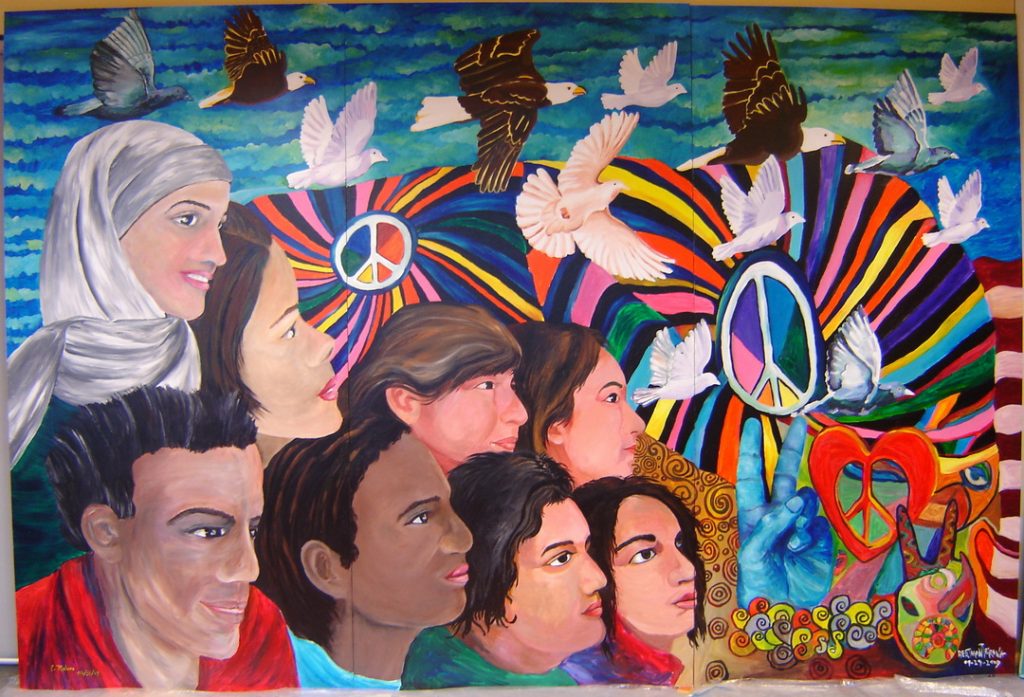
Good Morning Dear Friends…what a privilege it is for me to share some thoughts with you on this day when we are celebrating two of the things that are most precious to me in our our church: Our Awesome Youth and our Intentional Commitment to being an Open and A?rming community – one that welcomes and honors diversity and inclusion in all of its forms.
When I ?rst moved to Concord with my family in 2002, we did a fair amount of church shopping. Our hearts quickly found a home when we eventually tried out WCUC. In addition to the music, the sermons, and the youth programs, we noticed right away the warmth of this community and the many ways that it was living the ONA statement that it had voted on three years before our arrival. It was in May of 1999, that this church decided to publicly a?rm God’s call to love one another without exception and to recognize that welcoming such diversity enriches us all. This a?rmation proclaims out loud that we are, everyone one of us, a beloved child of God – no matter what we look like, who we love, how much money we make, how we move, think, or communicate…we are “fearfully and wonderfully made” by God’s hands – the One who knit us into being and intimately knows and loves us exactly the way we are.
May of 1999…that was 21 years ago – It was before anyone in our current youth group was even born. Many of you were here at that time and I’ve heard that it was both a joyful and challenging process, but you persisted and followed God’s voice to make it happen. And here we are today seeing the fruits of your labor a generation later. I asked some members of the youth group to re?ect on what it means to them that we are an ONA church. Listen to their voices:
“I think churches that are open and a?rming are great because they bring people from di?erent communities together as one and make people feel safe and comfortable – like they can express who they are and what they believe without any judgement – which I think is really important. I love WCUC because it’s such a welcoming, wonderful, and accepting community.”
“I think many people have associated Christianity with intolerance. If churches want to be accepting of all people as God intended, they should not put some people above others. My best friend wanted to ?nd a religion where she could be herself and explore her spirituality. She immediately ruled out Christianity because she thought we were not welcoming of the LGBTQ community. It means a lot to me that I can bring any of my friends, no exceptions, to youth group and know they will be welcomed and treated as equals.”
“This church is special to me because I know that I can bring every part of me and I will be welcomed, accepted, and celebrated for who I am. I don’t have to hide or pretend to be someone I’m not.”
Our ONA statement clearly sends the message that all are welcome here and that no matter who you are, there’s a place for you – You Belong Here. We want you to “come, live in the light” because we know there is Joy and Freedom to be found when we can be fully who God created us to be.
Our ONA statement also reminds us that we are better together – diversity enriches all of us and we need each other. I like to think of it as “Mirrors and Windows”. We all need to see ourselves re?ected in those around us and we all grow when we can look out and see something that’s new – something that is not part of our own experience but something that we can learn about and appreciate.
I remember the ?rst time a child in our church wore noise cancelling headphones to help her body handle the higher volume sounds in worship. A week later, another child wore them and then another. Mirrors say “you are like me in some way” and we can be ourselves together.
I also love and miss the “windows” that I look through when we’re sitting in our sanctuary on a Sunday morning: I see families who are formed in various ways, I see young and old bodies of all shapes and sizes, I witness the gifts of our SF friends and their caregivers, and I appreciate the multiple ways we express joy – ranging anywhere from silent prayer to loud and heartfelt outbursts when the organ starts playing.
In the early Christian church, when the Corinthians were trying to ?gure out how to live in community, Paul told them this:
“Just as a body has many parts, but all of its parts form one body, so it is with the body of Christ” (this is our church community!) “God put (us) together so that (our) parts should have equal concern for each other. If one part su?ers, (we all) su?er with it. If one part is honored, we all rejoice with it.”
Let’s keep these words in mind as we read our ONA statement together and remember how blessed we are to be a part of such a warm, welcoming and loving community of faith:
Our Open and A?rming Covenant (May 2, 1999; updated January 2020)
We, the members of the West Concord Union Church, are called to love one another as God loves us, freely and unconditionally. We further believe that diversity enriches our faith community.
Therefore, we welcome persons of any sexual orientation, gender identity and expression, age, race, socio-economic status, ethnicity, and physical and mental ability into full membership and participation in the body of Christ. We celebrate family in all its diverse forms and honor, support, and bless all loving and committed relationships. As we are one in Christ, we are called to accept and respect one another in the face of our di?erences. We agree that continued dialogue is necessary as we each grow in learning and understanding.
We commit ourselves to work diligently to end all oppression and discrimination which a?icts God’s people in our society. We seek to explore new ways of a?rming our faith in community according to the wisdom of the Gospel. We strive, as individuals, to become more Christlike in our love for one another.
But We had Hoped…
Luke 24:13-35
It’s the third Sunday of Easter. Maybe it feels like we should be farther along in the story by now. Maybe it feels like everyone should have already adjusted to the news of Jesus’ death and resurrection. But on this third Sunday of Easter, we receive a story from the Gospel of Luke in which it’s only hours since the empty tomb was discovered. We’re still in the very first day of Easter.
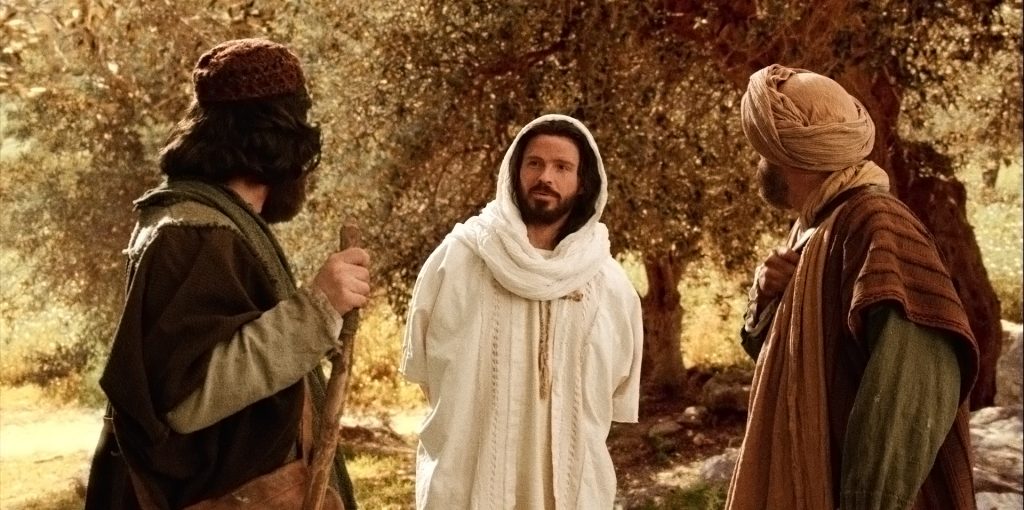
Two of Jesus’ followers are walking seven miles from Jerusalem to Emmaus. We don’t know why they go. While they walk, they discuss the troubling events of holy week. And then, miraculously, Jesus comes to join them.
For some reason, these apostles can’t recognize Jesus. And when this stranger asks what they are discussing, they hesitate: standing still, looking sad. But like most of us, they are grateful to find someone who is honestly curious, someone who will wait for an answer, someone who will really listen. So they tell this stranger how Jesus, a prophet mighty in deed and word, was handed over and crucified. “But we had hoped,” they say, “that he was the one to redeem Israel.”
But we had hoped! All of us know this feeling; the strange sense of disjointed surprise or disbelief that comes upon us after accident, illness, tragedy, pandemic. We had hoped, perhaps, for a miracle; or we had planned for a special event; or we had simply expected that life would go on as usual. But we had hoped, the apostles say, that he was the one to redeem Israel.
It’s painful to realize that you’re on an entirely different journey than the one you had hoped for, or planned for, or expected. Still, as one of my colleagues wrote this week, we have to travel the road we’re on, and not the one we wish we were on. We have to travel the road in front of us, not that other imagined, anticipated journey.
What would you tell Jesus – or anyone else who asked, and waited, and listened,– about the road you’re on today? If you had seven miles of slow travel, field and open sky around you, space and time and a compassionate ear? What would you say?

Some images of this story make me laugh. They may be beautiful, as this one certainly is. But it seems unbelievable that Cleopas and his companion do not recognize Jesus. The artists can’t help themselves; they make Jesus obvious to us. So it seems strange that the folks in the picture don’t get it. I want to say, Hey! He’s right there! Look at the halo! Check out the distinctive white robe!
But although many artists make Jesus beautifully obvious to us, I think many of us miss the holy encounters that we are a part of, at least in the moment when they are happening. Out of grief, or self-involvement, or practicality, we miss that there’s holy presence RIGHT THERE, beside us, in our most difficult moments, or in our everyday.
The two disciples do eventually recognize Jesus. It happens after that long walk, when he listens to them. It happens after he interprets the prophets and the scriptures for them, explaining the larger story that they’re living in. It happens when he blesses and breaks the bread at dinner that night; they know him in the breaking of the bread. Maybe there’s a reason that flour and yeast are hard to come by right now: something to touch, to taste; something that is real, and nourishing, like the presence of Christ.
Please pray with me: God, thank you for travelling with us, when things are not going as we had hoped, planned or expected; when we find ourselves on strange new roads. Thank you for listening to us, for as long as it takes, when our hearts are full of grief. Thank you for feeding us, with prophecy and presence, with bread and blessings. Amen.